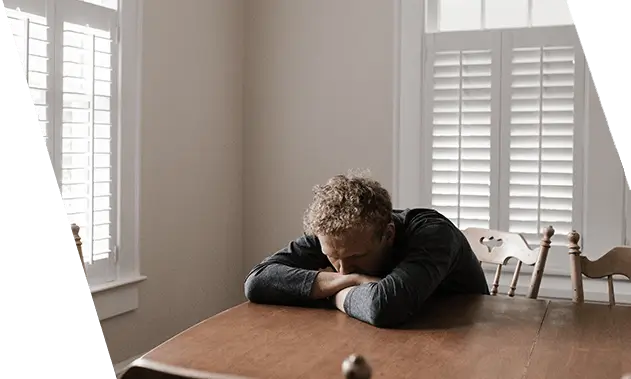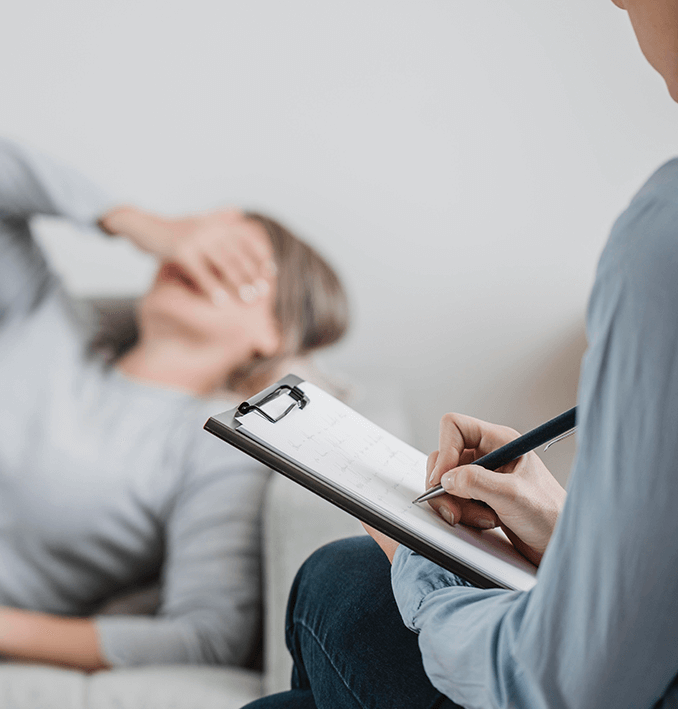Highlights
- It is possible to experience dizziness if you have an anxiety disorder, but it could also be due to other medical conditions.
- Even if you have been diagnosed with anxiety, it is essential to consult a healthcare provider to rule out dizziness caused by underlying medical conditions.
- Anxious people experiencing dizziness may describe it as head spinning, feeling off balance, lightheadedness, or fainting.
- People with anxiety disorders most often experience dizziness during a panic attack or times of longstanding intense anxiety.
- Dizziness as an anxiety symptom can be caused by rapid heart rate and fast breathing because of the fight or flight response.
Is It Possible I’m Feeling Dizzy Because of My Anxiety Disorder?
Can anxiety cause dizziness?
100% yes; feelings of dizziness or lightheadedness often go hand-in-hand with an anxiety disorder.
However, severe dizziness is not only a common symptom of anxiety and other mental health disorders but also many other medical conditions:
- Stroke
- Migraine
- Infections
- Low blood pressure
- Anaemia
- Thyroid disorders
- Lung problems
- Vestibular disorders or balance disorders
- Middle ear disorders
- Medication side effects
This is why you should always see a doctor if you have dizzy spells often or if they last a long time.
How Anxiety Causes Dizziness and Lightheadedness
So, what’s behind this anxiety and dizziness link?
Dizzy spells related to anxiety are typically caused by the fight-or-flight response, the body’s normal response to fear. In this case, physical signs of anxiety may be tremors, flushing, or sweating.
Nervousness and anxious feelings might trigger this stress reaction when your brain thinks you’re in danger, even if the threat isn’t real. Next, a flood of stress hormones results in an anxiety attack: fast breathing and increased heart rate spike your blood oxygen levels, preparing your body to defend itself or escape. This might lead to hyperventilation, changes in blood flow, muscle tension, and dehydration, all of which have a role to play in anxiety-related dizziness.
Let’s explore why this happens.
Hyperventilation
One of the factors causing dizziness related to anxiety is hyperventilation, which essentially means very fast and very deep breathing.
Try to remember your biology lessons; your lungs absorb oxygen and give off carbon dioxide (CO2). Hyperventilation dramatically lowers the blood levels of CO2 because you are
Hyperventilation can also cause physical sensations: chest pain or tightness, severe muscle contractions, numbness, or tingling.
Blood Flow Changes
During a sudden stress, your brain triggers an automatic reaction preparing you to fight or flee: increased heart rate
Tension and Muscle Tightness
You’ve experienced that stiff, painful neck when you’re anxious; believe it or not, that tension can cause dizziness:
- Tense neck muscles might
change the sensory information[3] (vision and head position) your brain needs for balance. - Neck tension is thought to squeeze the blood vessels in the area and block blood flow to the brain.
- Tight neck muscles can interfere with the vestibular system. This is the fancy name for the complicated inner ear system that helps to control your balance and spatial orientation.
Dehydration and Fatigue
Dehydration can contribute to dizziness associated with anxiety in a few ways.
Firstly, if you’re anxious, you’ll know firsthand that you often forget to eat and drink or might lose your appetite altogether. Secondly, fast breathing causes you to lose fluid with every breath and might be made worse by mouth breathing or panting during a panic attack.
Importantly, anxiety can cause dizziness that feels different from person to person.

How Dizziness Linked to Anxiety Might Feel
Let’s run through the various dizziness symptoms and presentations.
Lightheadedness
Lightheadedness means feeling faint or that you might pass out, usually caused by decreased blood flow to the brain. Generally, it is the same feeling you experience if you stand up from lying down too quickly or have low blood pressure. People who feel lightheaded may also feel weak and tired.
Vertigo
People with
- Constant dizziness
- Waves of dizziness
In anxiety, vertigo is believed to be caused by poor function of the vestibular system, discussed earlier.
Other symptoms associated with vertigo are nausea, also a symptom of anxiety, and a feeling of losing balance; it is not a pleasant presentation of dizziness.

Unsteadiness or Feeling Off-Balance
A feeling of being unbalanced or unsteady on your feet is the feeling that you:
- Can’t stay upright and might fall over
- Are walking sideways instead of straight
This manifestation of dizziness might occur on its own or with vertigo or lightheadedness.
How Long Does Dizziness from Anxiety Last?
Again, just like anxiety, dizziness feels different for everyone, how long an episode might last also varies. Some of the factors that could play a role are:
- The type of anxiety disorder
- The situation triggering the anxiety
- How well controlled the anxiety disorder is
- Other co-occurring medical disorders
This could be anywhere from a few seconds to hours. However long it lasts, if you fall over, can’t walk straight, or faint, or if the dizziness occurs often, see a doctor.
So, anxiety definitely causes dizziness, but the next question is whether dizziness can cause anxiety.
When Dizziness Becomes a Cycle of Anxiety
I’m sure it will make sense to you that a person with anxiety experiencing dizziness may develop a fear of falling due to fainting or losing balance. Fear, as you now know, triggers anxiety, and so a vicious circle might begin.
How to Stop Dizziness from Anxiety?
That said, the first thing you should do if you feel lightheaded or experience dizziness is sit or lie down. Doing this will reduce the risk of falling and make you feel safer.
Next, tackle anxiety-induced dizziness with strategies that treat anxiety disorders: self-help techniques, lifestyle changes, and doctor-recommended management.
Self-help Techniques
Breathing Exercises
Deep breathing techniques are tried and trusted when it comes to calming any anxiety, including
panic attacks. In addition, they might help with hyperventilation by slowing the breathing rate. The 4-7-8 technique can help achieve this.
- Breathe in for 4 seconds so that your belly rises
- Hold your breath for 7 seconds
- Breathe out for 8 seconds, forcing the breath out through pursed lips
To get the
Grounding Exercises
Grounding exercises draw your attention away from your anxiety and
- Turning down an imaginary emotional dial
- Naming the red objects in the room
- Using guided imagery, such as imagining a safe place
- Counting backwards from 100
- Wiggling toes, stretching fingers, or clenching fists
Progressive Muscle Relaxation (PMR)
Progressive muscle relaxation techniques start with one muscle group, actively and consciously relaxing those muscles, then moving on to the next group. An easy way of doing this is starting with the feet, working your way up the body, and ending with your head.
Lifestyle Modifications
Anxiety has negative influences on daily life and mental and physical health. Lifestyle changes are essential to reduce the risk of anxiety attacks, the resulting dizziness, and other physical symptoms.
Hydration and Nutrition
Ensure you drink water and eat balanced meals regularly, as low blood sugar and dehydration can make you feel dizzy.
Limited Caffeine and Sugar
Pure sugars and refined carbohydrates are broken down and used quickly by your body; this might cause a spike in blood sugar followed by a plunge. Both these sugar highs and lows could make you feel lightheaded and start the cycle of dizziness and anxiety.
Additional Treatments and Long-Term Strategies
If your anxiety disorder is uncontrolled, you will be at increased risk of experiencing dizziness and other physical symptoms of anxiety. And both longstanding (chronic) and sudden (acute) severe anxiety can be accompanied by anxiety-induced dizziness.
In cases like this, it is crucial to seek professional help from a healthcare professional and get a personalized treatment plan, including
Therapy Options
Psychotherapy, or talk therapy, is a foundation for treating anxiety. It centers around changing the thoughts and behaviors that trigger your anxious feelings.
Also, if vertigo, muscle tension, or being off-balance are prominent symptoms, your mental health professional might recommend that you see a physical therapist.
Medication
Finally, your healthcare provider might prescribe medication as part of your anxiety disorder treatment plan. Below are some of the commonly used options:
- Selective serotonin reuptake inhibitors (SSRIs)
- Serotonin-norepinephrine reuptake inhibitors (SNRIs)
- Benzodiazepines
- Tricyclic antidepressants
- Beta-blockers
After discussing with you your symptoms and health history, as well as the benefits and potential side effects of different medications for anxiety, your doctor will decide which medication can be best for you. Explore online anxiety treatment to connect with experienced providers and develop a care plan tailored to your needs.
Summing It Up
It is common to experience dizziness if you have an anxiety disorder, and importantly, treating anxiety is the key to feeling better. However, remember that dizziness can be a symptom of other medical conditions, so it’s important to see a doctor to get an accurate diagnosis and treatment.
If you want to learn whether you have an anxiety disorder, book an online appointment with a licensed healthcare provider at MEDvidi.














